Module 11 Body language Unit 2 Here are some ways to welcome them.课件43张缺少音频
文档属性
| 名称 | Module 11 Body language Unit 2 Here are some ways to welcome them.课件43张缺少音频 |
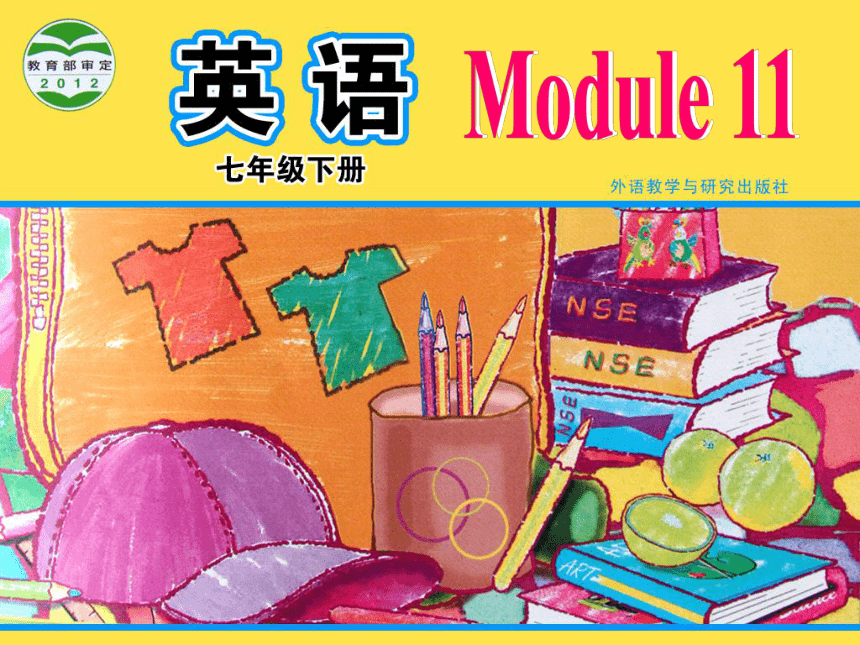
|
|
| 格式 | ppt | ||
| 文件大小 | 4.4MB | ||
| 资源类型 | 教案 | ||
| 版本资源 | 外研版 | ||
| 科目 | 英语 | ||
| 更新时间 | 2019-06-03 18:56:40 | ||
图片预览


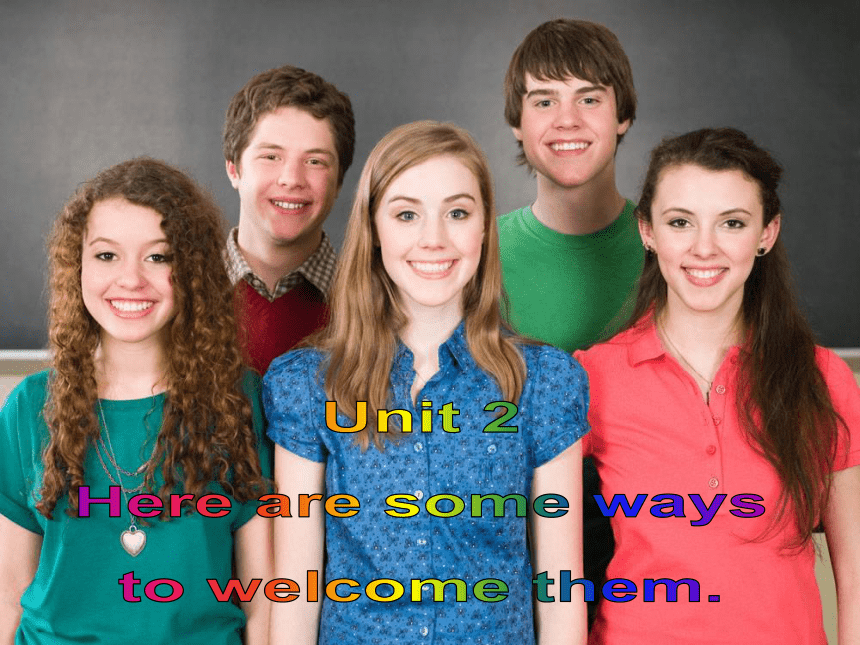
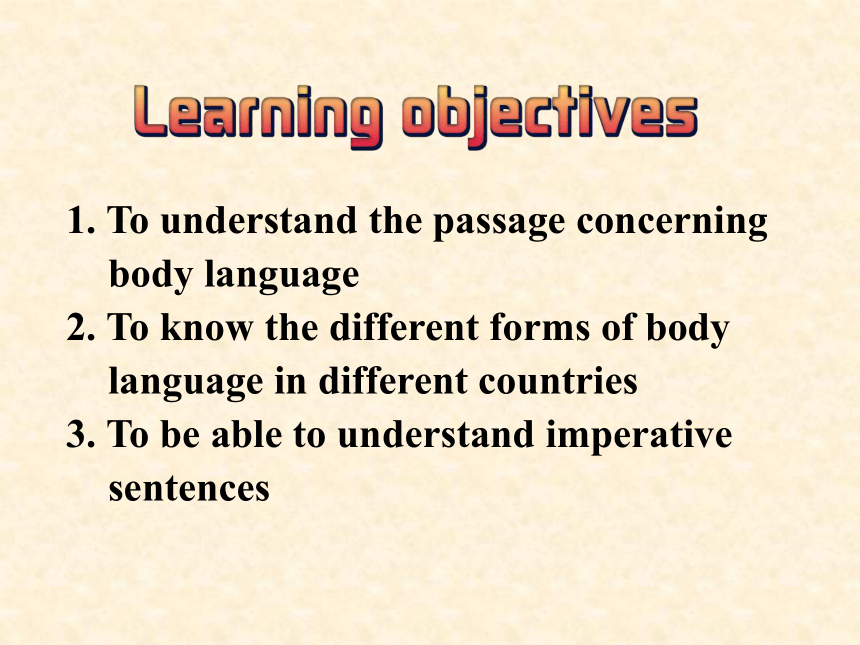
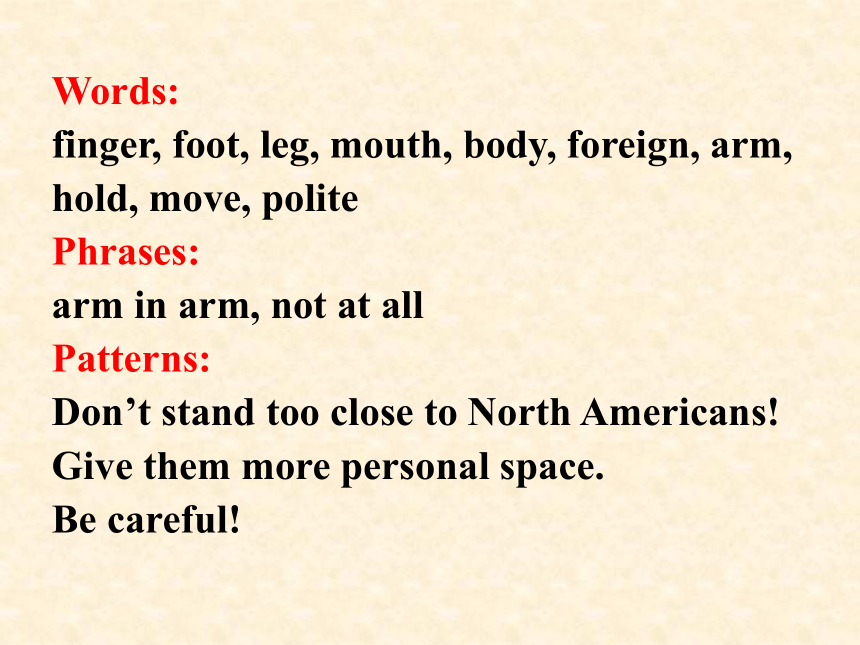
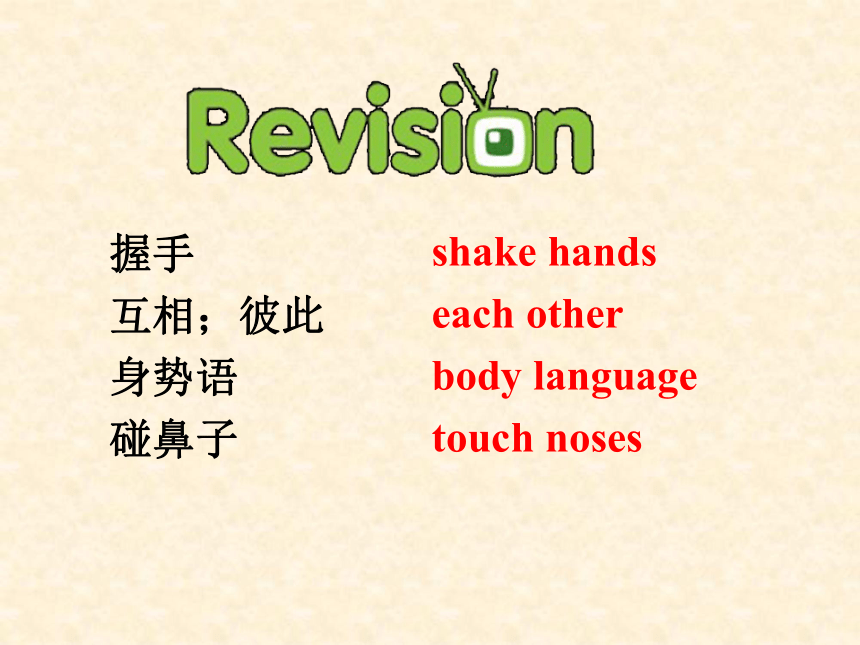
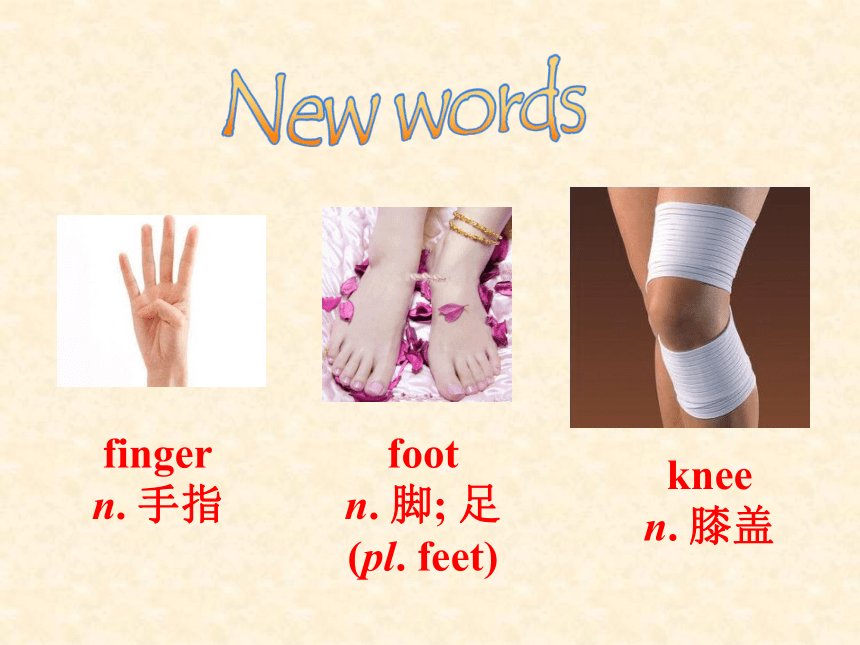
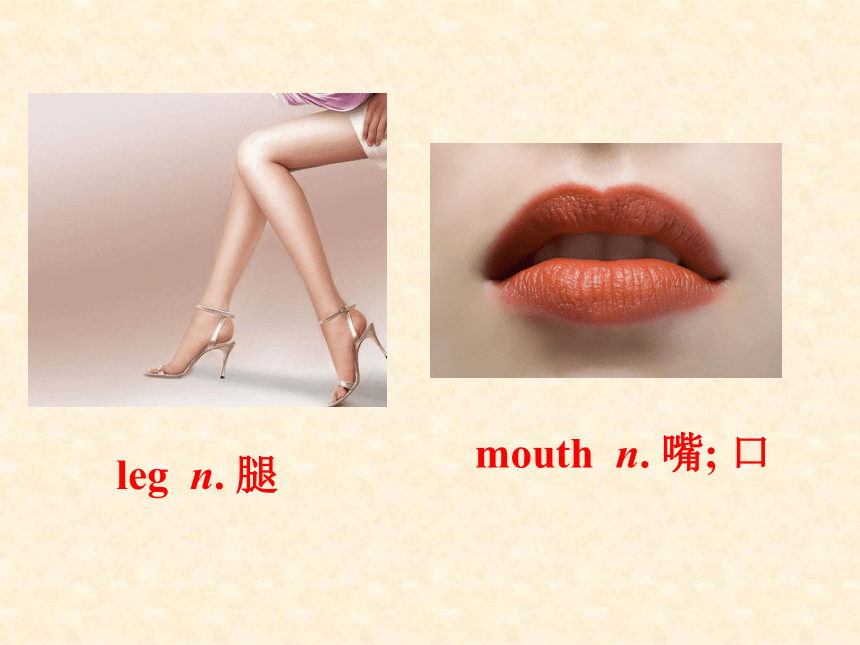
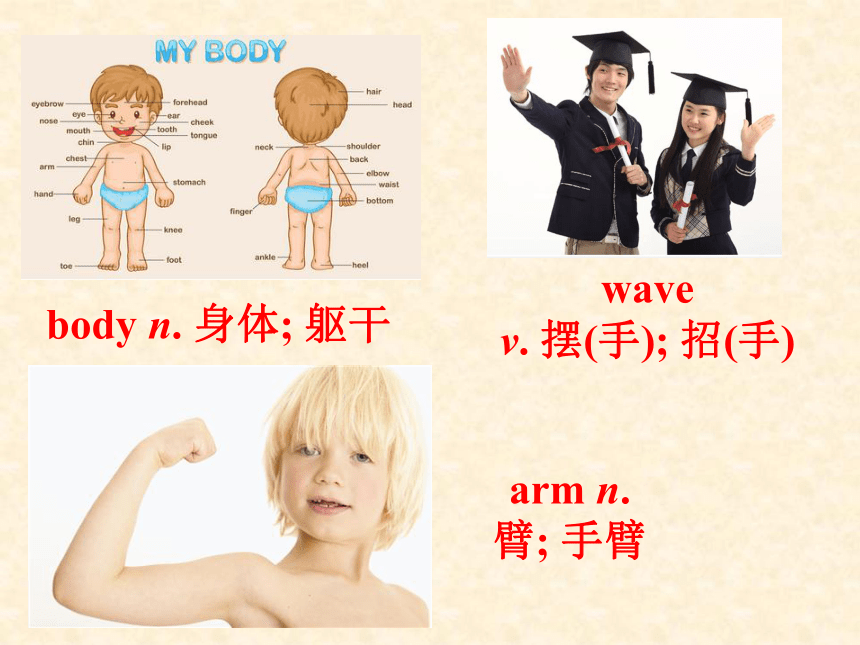
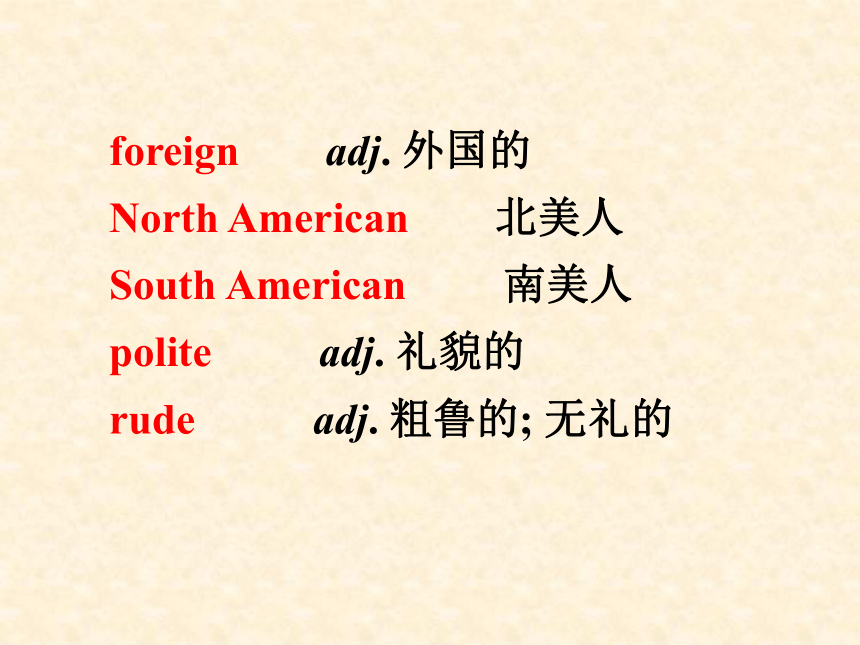

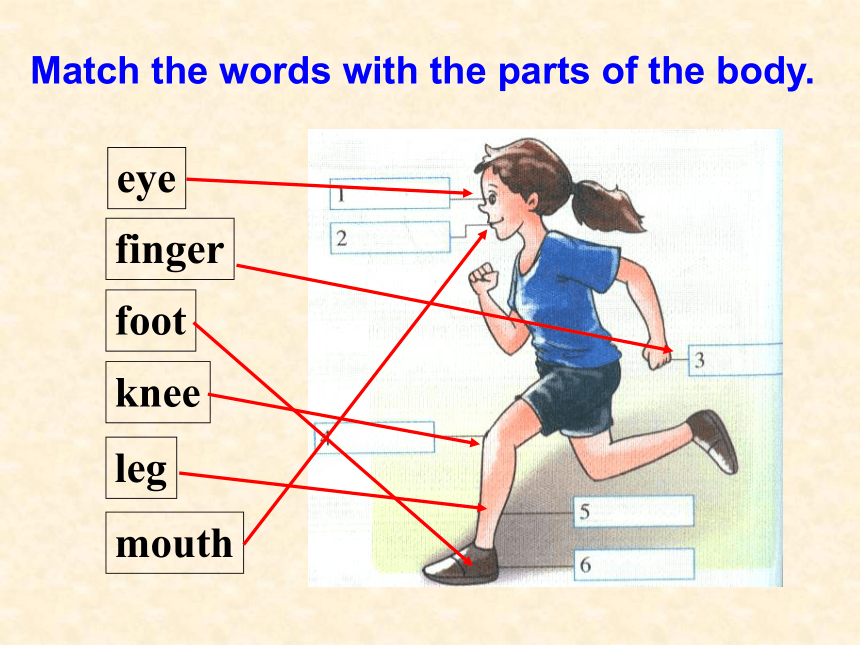
文档简介
(共43张PPT)
1. To understand the passage concerning body language
2. To know the different forms of body language in different countries
3. To be able to understand imperative sentences
Words:
finger, foot, leg, mouth, body, foreign, arm, hold, move, polite
Phrases:
arm in arm, not at all
Patterns:
Don’t stand too close to North Americans!
Give them more personal space.
Be careful!
握手
互相;彼此
身势语
碰鼻子
shake hands
each other
body language
touch noses
finger
n. 手指
foot
n. 脚; 足
(pl. feet)
knee
n. 膝盖
leg n. 腿
mouth n. 嘴; 口
wave
v. 摆(手); 招(手)
arm n.
臂; 手臂
body n. 身体; 躯干
foreign adj. 外国的
North American 北美人
South American 南美人
polite adj. 礼貌的
rude adj. 粗鲁的; 无礼的
eye
finger
foot
knee
leg
mouth
Match the words with the parts of the body.
Watch the video.
Check (√) the body language you can use in different countries and places.
Stand close Touch each other Look at people when talking
Britain
Middle East
South America
US
√
√
√
√
1. Is body language the same in different
countries
No, it isn’t.
2. Is it all right to stand close to people in
the Middle East
Yes, it is.
Listen and answer the questions.
3. Do the British like touching people
No, they don’t.
4. Do Americans look at people when they
talk
Yes, they do.
5. Do people in Greece wave goodbye
No, they don’t.
1. give them more personal space
2. hold your arm
3. looking at people
wave
4. Britain and the US
Read and fill in the blanks.
Body language around the world
Britain fact foreign hold move personal polite rude someone wave
Lingling: People from (1) ________ countries have different body language from us. In (2) _______, people don’t like to touch other people, but in South
foreign
Britain
Complete the passage with the words from the box.
America they like to (3) _______ on to you so you can’t (4) _______ away. Remember to give (5) ________ from North America lots of (6) ________ space. In some countries it isn’t (7) _______ to look at people when you talk. And it isn’t polite to (8) _______ goodbye in Greece. In (9) ______, it’s quite (10) _______!
hold
move
someone
personal
polite
wave
fact
rude
— Shall we stand up when we answer
a question in class
— Yes, we shall.
Work in groups. Talk about the class rules.
— Shall we eat food in class
— No, we shall not.
when the teacher comes into the classroom
when you want to ask questions during the class
When you want to ask for a toilet break
Make a list of class rules for new students in your school.
Stand up when you answer a question in class.
Don’t be late for class.
Be polite to the teacher.
Don’t eat food in class.
…
Possible answers
Don’t take another student’s things.
Don’t push anyone when in line.
Don’t shout.
Ask the teacher when you need to leave the class.
Walk quickly around the school.
Do what the teachers say the first time they ask.
Respect other students.
Be helpful to new students.
北美人
南美人
臂挽臂地
一点也不
事实上
与某人交谈
个人空间
抓住某人的胳膊
走开
别的地方
North American
South American
arm in arm
not at all
in fact
talk to sb.
personal space
hold one’s arm
move away
somewhere else
Ⅰ. 根据语境用括号内所给单词的适当形式填空。
1. Be careful with your ________(finger) when you do sports.
2. That big bird has got long ________(leg). It’s good at running.
3. He is tall with a strong ________(body). He wants to join the Basketball Club.
fingers
legs
body
4. Six monkeys are ________(move) on the screen.
5. There are some ducks with big ________(mouth) in the picture.
moving
mouths
Ⅱ. 根据语境及所给汉语提示语写出所缺单词。
1. Wash your ________(脚) before you go to sleep, kids.
2. Are these things good for our ________(膝盖)
3. She is good and ________(礼貌的).
4. Have you got your ________(个人的) plan
5. His dog was lost ___________(某处). Maybe it’s in the park now.
feet
knees
polite
personal
somewhere
1. I played basketball with several ________________ at that time.
2. Look! They are walking on the street ____________.
3. The soup is ____________ warm. It’s even cold.
Ⅲ. 根据语境从方框中选择恰当的短语填空,有的需要变换形式。
in fact, North American, arm in arm, talk to, not at all
North Americans
arm in arm
not at all
4. ____________, he is from a town along the coast.
5. Miss Yang is ____________ her students in the classroom.
in fact, North American, arm in arm, talk to, not at all
In fact
talking to
1. Give them more personal space.
personal adj. 个人的
常在句中作定语。反义词为public, 意为“公共的; 公众的”。
e.g. It’s his personal room.
【运用】将下面的汉语句子翻译成英语。
不要问任何私人的问题。那是不礼貌的。
_____________________________________
___________________________________
Don’t ask any personal questions. It’s not polite.
2. Chinese girls often walk arm in arm with their friends.
arm in arm 表示“臂挽臂地”。
翻译句子:
They walked along the beach arm in arm.
_____________________________
他们臂挽着臂沿着海滩走。
3. South Americans sometimes hold your arm when they talk to you, so you can’t move away.
hold (held/held) v. 握着; 使不动
e.g. The girl held her father’s hand.
女孩儿拉着她父亲的手。
move可用作不及物动词, 意思是“移动; 搬(家)”, 后跟宾语时需借助介词to, 其中to表示方向。
e.g. They moved to Shanghai in 1997.
他们1997年搬到了上海。
move away 表示“挪开, 走开”。
4. But in Britain many people don’t like other people to touch them at all.
not ... at all 意为“一点也不……”。
另外, not at all连起来在正式场合使用, 可以表示“不用谢; 不客气”。
e.g. I don’t know her at all.
我根本不认识她。
—Thank you very much. 非常感谢。
—Not at all. 不用谢。
将下面的汉语句子翻译为英语。
1. 我根本不喜欢游泳。
_______________________________
2. —非常感谢你的帮助。
—不用谢。
—______________________________
—______________________________
I don’t like swimming at all.
Thanks a lot for your help.
Not at all.
5. In some places, it isn’t polite to look at people when you talk, but in other countries it isn’t polite to look somewhere else.
此句结构为It is / isn’t + adj. + to do
sth.,其中it为形式主语,to do sth.为
真正的主语。可用于此结构的形容词
有rude, important, bad, good, easy,
difficult等。
e.g. _________________________
说“谢谢你”是有礼貌的。
It’s bad to stay up. (翻译)
_________________ a new language.
学习一门新语言不容易。
It’s polite to say “thank you”.
It isn’t easy to learn
熬夜不好。
somewhere表示“在某地”,somewhere else表示“在其它的某个地方”。
6. In fact, it’s very rude!
in fact表示“事实上,实际上”, 相当于as a matter of fact。
e.g. In fact, I think you’re right. 事实上, 我认为你是对的。
Write a short passage about the body language in China. You can use the following questions to help you.
How do Chinese greet each other when they meet
How do Chinese say goodbye
…
1. To understand the passage concerning body language
2. To know the different forms of body language in different countries
3. To be able to understand imperative sentences
Words:
finger, foot, leg, mouth, body, foreign, arm, hold, move, polite
Phrases:
arm in arm, not at all
Patterns:
Don’t stand too close to North Americans!
Give them more personal space.
Be careful!
握手
互相;彼此
身势语
碰鼻子
shake hands
each other
body language
touch noses
finger
n. 手指
foot
n. 脚; 足
(pl. feet)
knee
n. 膝盖
leg n. 腿
mouth n. 嘴; 口
wave
v. 摆(手); 招(手)
arm n.
臂; 手臂
body n. 身体; 躯干
foreign adj. 外国的
North American 北美人
South American 南美人
polite adj. 礼貌的
rude adj. 粗鲁的; 无礼的
eye
finger
foot
knee
leg
mouth
Match the words with the parts of the body.
Watch the video.
Check (√) the body language you can use in different countries and places.
Stand close Touch each other Look at people when talking
Britain
Middle East
South America
US
√
√
√
√
1. Is body language the same in different
countries
No, it isn’t.
2. Is it all right to stand close to people in
the Middle East
Yes, it is.
Listen and answer the questions.
3. Do the British like touching people
No, they don’t.
4. Do Americans look at people when they
talk
Yes, they do.
5. Do people in Greece wave goodbye
No, they don’t.
1. give them more personal space
2. hold your arm
3. looking at people
wave
4. Britain and the US
Read and fill in the blanks.
Body language around the world
Britain fact foreign hold move personal polite rude someone wave
Lingling: People from (1) ________ countries have different body language from us. In (2) _______, people don’t like to touch other people, but in South
foreign
Britain
Complete the passage with the words from the box.
America they like to (3) _______ on to you so you can’t (4) _______ away. Remember to give (5) ________ from North America lots of (6) ________ space. In some countries it isn’t (7) _______ to look at people when you talk. And it isn’t polite to (8) _______ goodbye in Greece. In (9) ______, it’s quite (10) _______!
hold
move
someone
personal
polite
wave
fact
rude
— Shall we stand up when we answer
a question in class
— Yes, we shall.
Work in groups. Talk about the class rules.
— Shall we eat food in class
— No, we shall not.
when the teacher comes into the classroom
when you want to ask questions during the class
When you want to ask for a toilet break
Make a list of class rules for new students in your school.
Stand up when you answer a question in class.
Don’t be late for class.
Be polite to the teacher.
Don’t eat food in class.
…
Possible answers
Don’t take another student’s things.
Don’t push anyone when in line.
Don’t shout.
Ask the teacher when you need to leave the class.
Walk quickly around the school.
Do what the teachers say the first time they ask.
Respect other students.
Be helpful to new students.
北美人
南美人
臂挽臂地
一点也不
事实上
与某人交谈
个人空间
抓住某人的胳膊
走开
别的地方
North American
South American
arm in arm
not at all
in fact
talk to sb.
personal space
hold one’s arm
move away
somewhere else
Ⅰ. 根据语境用括号内所给单词的适当形式填空。
1. Be careful with your ________(finger) when you do sports.
2. That big bird has got long ________(leg). It’s good at running.
3. He is tall with a strong ________(body). He wants to join the Basketball Club.
fingers
legs
body
4. Six monkeys are ________(move) on the screen.
5. There are some ducks with big ________(mouth) in the picture.
moving
mouths
Ⅱ. 根据语境及所给汉语提示语写出所缺单词。
1. Wash your ________(脚) before you go to sleep, kids.
2. Are these things good for our ________(膝盖)
3. She is good and ________(礼貌的).
4. Have you got your ________(个人的) plan
5. His dog was lost ___________(某处). Maybe it’s in the park now.
feet
knees
polite
personal
somewhere
1. I played basketball with several ________________ at that time.
2. Look! They are walking on the street ____________.
3. The soup is ____________ warm. It’s even cold.
Ⅲ. 根据语境从方框中选择恰当的短语填空,有的需要变换形式。
in fact, North American, arm in arm, talk to, not at all
North Americans
arm in arm
not at all
4. ____________, he is from a town along the coast.
5. Miss Yang is ____________ her students in the classroom.
in fact, North American, arm in arm, talk to, not at all
In fact
talking to
1. Give them more personal space.
personal adj. 个人的
常在句中作定语。反义词为public, 意为“公共的; 公众的”。
e.g. It’s his personal room.
【运用】将下面的汉语句子翻译成英语。
不要问任何私人的问题。那是不礼貌的。
_____________________________________
___________________________________
Don’t ask any personal questions. It’s not polite.
2. Chinese girls often walk arm in arm with their friends.
arm in arm 表示“臂挽臂地”。
翻译句子:
They walked along the beach arm in arm.
_____________________________
他们臂挽着臂沿着海滩走。
3. South Americans sometimes hold your arm when they talk to you, so you can’t move away.
hold (held/held) v. 握着; 使不动
e.g. The girl held her father’s hand.
女孩儿拉着她父亲的手。
move可用作不及物动词, 意思是“移动; 搬(家)”, 后跟宾语时需借助介词to, 其中to表示方向。
e.g. They moved to Shanghai in 1997.
他们1997年搬到了上海。
move away 表示“挪开, 走开”。
4. But in Britain many people don’t like other people to touch them at all.
not ... at all 意为“一点也不……”。
另外, not at all连起来在正式场合使用, 可以表示“不用谢; 不客气”。
e.g. I don’t know her at all.
我根本不认识她。
—Thank you very much. 非常感谢。
—Not at all. 不用谢。
将下面的汉语句子翻译为英语。
1. 我根本不喜欢游泳。
_______________________________
2. —非常感谢你的帮助。
—不用谢。
—______________________________
—______________________________
I don’t like swimming at all.
Thanks a lot for your help.
Not at all.
5. In some places, it isn’t polite to look at people when you talk, but in other countries it isn’t polite to look somewhere else.
此句结构为It is / isn’t + adj. + to do
sth.,其中it为形式主语,to do sth.为
真正的主语。可用于此结构的形容词
有rude, important, bad, good, easy,
difficult等。
e.g. _________________________
说“谢谢你”是有礼貌的。
It’s bad to stay up. (翻译)
_________________ a new language.
学习一门新语言不容易。
It’s polite to say “thank you”.
It isn’t easy to learn
熬夜不好。
somewhere表示“在某地”,somewhere else表示“在其它的某个地方”。
6. In fact, it’s very rude!
in fact表示“事实上,实际上”, 相当于as a matter of fact。
e.g. In fact, I think you’re right. 事实上, 我认为你是对的。
Write a short passage about the body language in China. You can use the following questions to help you.
How do Chinese greet each other when they meet
How do Chinese say goodbye
…
同课章节目录
- Module 1 Lost and found
- Unit 1 Whose bag is this?
- Unit 2 Are they yours?
- Unit 3 Language in use
- Module 2 What can you do ?
- Unit 1 I can play the piano
- Unit 2 I can run really fast
- Unit 3 Language in use
- Module 3 Making plans
- Unit 1 What are you going to do at the weekends?
- Unit 2 We're going to cheer the players.
- Unit 3 Language in use
- Module 4 Life in the future
- Unit 1 Everyone will study at home
- Unit 2 Every family will have a small plane.
- Unit 3 Language in use
- Module 5 Shopping
- Unit 1 What can I do for you?
- Unit 2 You can buy everything on the Internet
- Unit 3 Language in use
- Module 6 Around town
- Unit 1 Could you tell me how to get to the Nationa
- Unit 2 The London Eye is on your right.
- Unit 3 Language in use
- Revision module A
- Module 7 My past life
- Unit 1 I was born in a small village.
- Unit 2 I was born in Quincy.
- Unit 3 Language in use
- Module 8 Story time
- Unit 1 Once upon a time….
- Unit 2 Goldilocks hurried out of the house.
- Unit 3 Language in use
- Module 9 Life history
- Unit 1 He left school and began work at the age of
- Unit 2 He decided to be an actor.
- Unit 3 Language in use
- Module 10 A holiday journey
- Unit 1 What did you do?
- Unit 2 This morning we took a walk.
- Unit 3 Language in use
- Module 11 Body language
- Unit 1 They touch noses!
- Unit 2 Here are some ways to welcome them.
- Unit 3 Language in use
- Module 12 Western music
- Unit 1 It's so beautiful!
- Unit 2 Vienna is the centre of European classical
- Unit 3 Language in use
- Revision module B
